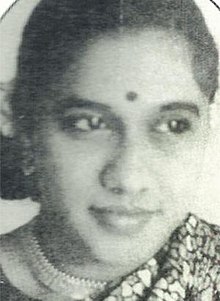Anasuya Shankar
This article needs additional citations for verification. (October 2012) |
Anasuya Shankar | |
|---|---|
 | |
| Born | 1 September 1928 Mandya, Kingdom of Mysore, British India |
| Died | 1963 (aged 34–35) |
| Pen name | Triveni |
| Occupation | Novelist |
| Language | Kannada |
| Nationality | Indian |
| Education | Bachelor of Arts |
| Alma mater | Maharani Arts & Science College, Mysore |
| Period | 1953–1963 |
| Spouse | S. N. Shankar |
| Children | 1 |
| Relatives | B. M. Srikantaiah (uncle) |
Anasuya Shankar (Template:Lang-kn; 1928 – 1963), popularly known by her pen name as Triveni (Template:Lang-kn), was an Indian writer of modern fiction in Kannada language. She advocated the woman's point of view, spoke up for women's repressions and suppressions, dealt with mental illness and how they should be treated and was among the first of such writers in Kannada. Her novels have been made into feature films, most prominently, Belli Moda (1967) and Sharapanjara (1971) – both directed by Puttanna Kanagal and featuring actress Kalpana. Her novel Avala Mane earned the Karnataka Sahitya Academy Award in 1960.
Life
Anasuya Shankar was born on September 1, 1928, in Mandya in the erstwhile Kingdom of Mysore of British India, to B. M. Krishnaswamy and Thangamma. She was also called as Anasuya and Bhagirathi. She graduated with a gold medal in her Bachelor of Arts degree from Maharani's Arts College in Mysore.[citation needed] She later married an English professor, S. N. Shankar. They have a daughter, Meera.[citation needed]
Triveni got her pen-name by accident. She always made two plaits (in Sanskrit/Kannada, veni means plait) in her hair. A friend told her she had enough hair not just for two, but three plaits. Anasuya thought that tri-veni was a nice name and started using that as her pen-name.[citation needed]
Career
Triveni published her first novel Apasvara in 1953.[1] After that, she published 20 novels and 3 short story collections.[2] Her novels mainly contained stories based on the psychological issues faced by women, their emotions and frustrations.[2]
Novels
- Vava
- Apaswara
- Sotu Geddavalu
- Bekkina Kannu
- Modala Hejje
- Keelu Gombe
- Apajaya
- Kankana
- Mucchida Bagilu
- Baanu Belagitu
- Mukti
- Hrudaya Gita
- Avala Mane
- Tavareya Kola
- Vasantagaana
- Kashi yatre
- Sharapanjara
- Hannele Chiguridaga
- Avala Magalu
- Belli Moda
- Doorada Betta
Collection Of Short Stories
- Hendatiya Hesaru
- Yeradu Manasu
- Samasyeya Magu
Novels made into movies
- Sharapanjara
- Hoovu Hannu
- Kankana
- Hannele Chiguridaga
- Belli moda
- Mukti
References
- ^ Sisir Kumar Das. A History Of Indian Literature 1911-1956. Sahitya Akademi. p. 834. ISBN 81-7201-798-7.
- ^ a b Susie J. Tharu, Ke Lalita (1991). Women Writing in India: 600 B.C. to the Present. Feminist Press. p. 285. ISBN 1-55861-029-4.
